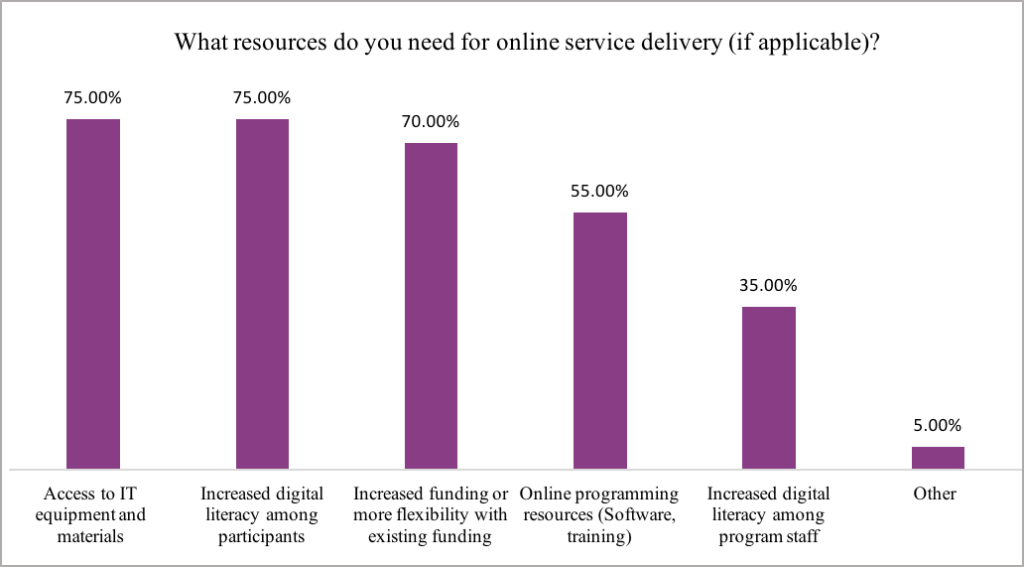The COVID-19 pandemic has raised daily questions about equity, expanded the public’s imagination of what is possible and led to significant shifts in the labour market. As the economy continues to re-open, the question becomes: What will the “new normal” look like? Requirements around physical distancing forced workplaces to adopt new practices, including new screening tools, distancing measures and remote work. While these were initially intended to be emergency measures, they have opened the door for employers and the government to define new norms in the labour market. This is a crucial moment for employers and policy-makers in Canada to boldly adopt policies that empower and accommodate women’s needs in the workforce.
YWCA’s Born to be Bold project identified a number of practices for increasing women’s access to gainful employment. The pandemic has only magnified existing inequities and demonstrated the need for person-centred solutions for women to thrive in the labour market. Women make up the majority of employees in essential services roles; consequently, they have faced higher levels of unemployment and a reduction in work hours. Women also serve in high numbers in frontline roles, increasing their risk of exposure to the virus and underscoring the need for safer work environments. The practices proposed here provide an avenue for employers and policy-makers to create long-term change for women’s participation in the labour market.
Develop an organizational strategy
In establishing new working norms, employers should develop a holistic organizational strategy to guide their operations and support their workers. Robust organizational support is critical for women and marginalized people who face disproportionate rates of violence and financial stress. The following recommendations are key components of such a strategy; however, each organization is unique in its work, people and culture, and must look to its people to develop an equitable, person-centred strategy that takes into account the diverse identities and needs of women. Such a strategy must put the survival and wellbeing of people first.
Adopt long-term flexible working arrangements
The current shift to remote work is an important step toward a more equitable labour market. In the Born to be Bold findings, about 63 per cent of survey respondents selected “work hours flexibility” as a component of their ideal job, making it a top recommendation. Flexibility in working conditions was also mentioned in 52 per cent of focus groups and interviews.
As one focus group participant stated, “Life doesn’t fit into a nine-to-five box.” Flexibility in work hours and location enable women to access the labour market while balancing other responsibilities such as unpaid care and domestic work, caring for elderly family members, and the increase in domestic responsibilities during conventional work hours that has accompanied the pandemic and its shift to working from home.
With the implementation of virtual remote work, it is also important to simultaneously create a safety strategy and concrete measures to support victims of abuse and violence.
Provide childcare, allowances and paid leave
Childcare availability has a direct impact on women’s participation in the labour market. For many, it has “felt like (they) had to put life on hold until kids were old enough to go to school,” as one Born to be Bold focus group participant said. A lack of accessible, affordable and safe childcare was mentioned as a main barrier to gainful employment in 77 per cent of Born to be Bold focus groups and interviews. Childcare support must be offered to parents during and beyond the COVID-19 crisis.
Distancing measures and school and childcare closures have brought forth additional barriers. Childcare support systems and other childminding options are limited and parents are expected to support an e-learning curriculum. Working parents are put under extraordinary pressure as they are expected to balance childminding and working.
As childcare services reopen, childcare allowances can ease financial strain and ensure employees are able to carry out their duties. Safe, on-site, free childcare with extended hours must be offered to workers. Moreover, instituting paid leave would ensure employees do not have to choose between financial stability, domestic responsibilities and their wellbeing.
Provide funding to supply equipment and training for remote work
The government and employers must equip the labour force with efficient tools to enable a sustainable transition to new working conditions. Not every household has access to a computer or reliable wireless internet connection. Providing funding, equipment and universal internet access would alleviate the financial burden caused by virtual work. The Canadian government should create grants to supplement Canada’s transition to virtual working arrangements. Employers should supplement costs incurred from virtual working arrangements, including internet and phone expenses, virtual conferencing platforms and office equipment.
In a July survey, local YWCAs identified access to information technology equipment and materials, alongside digital literacy training, as the top resources required for online service delivery. This demonstrates the need for increased access to equipment and training in order to make remote workplaces more accessible and sustainable.

Source: Born to be Bold: COVID-19 Update, YWCA Canada
Virtual remote work is a new practice for many. It is important to create training programs and guidelines to empower employees to use new equipment and technologies. Formalized training and guidelines can strengthen employees in their work, ensuring they are equipped to carry out their responsibilities.
The existing disparities in labour market practices have been amplified by the COVID-19 crisis. Now is the opportunity to use this disruption to redefine how we work, by creating employment that works for everyone, no matter their circumstances.
Cherie Wong is an independent researcher, writer and consultant, as well as the Executive Director of Alliance Canada Hong Kong.
Shiva Mazrouei is the Research Officer for the Born to be Bold: Measuring women’s success in the labour market project at YWCA Canada.
Sydney Piggott is the Director of Programs and Projects at YWCA Canada.


